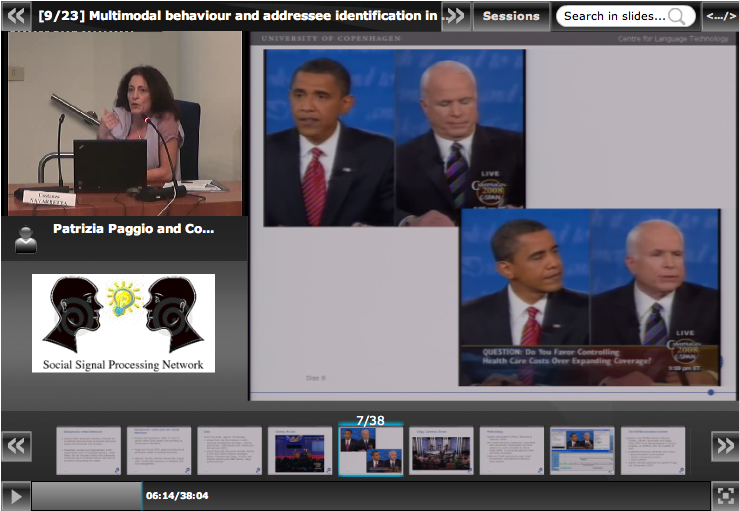The International Workshop POLITICAL SPEECH – IL PARLATO POLITICO – was held in Roma italy on November 10th – 12th, 2010. Full information about the program is available
Mission of the workshop
Ever since classical oratory studies, epideictic and judicial rhetoric have been distinguished from deliberative rhetoric, which includes political discourse. And in all these genres, Cicero and Quintilianus credit high relevance to actio, i.e., all the aspects of discourse performance, in which the Orator must care not only words, but intonation, gesture, facial expression, body movements, etc., so as to be more persuasive.
In the last years, the body has been considered more and more important in political communication, especially because of the ubiquitous presence of political news and political talk shows in media. Moreover, body related aspects of persuasive communication have gained new concern in the research areas of Persuasive Agents and Social Signal Processing.
This workshop aims at investigating “political speech”: the monological and dialogical forms where political persuasion is attained through face to face or media communication, making use of the whole repertoire of body communication, including words, prosody, gesture, gaze, face, posture, proxemics, etc.
The target research questions are the following:
* Are there body signals typical of political discourse, and more generally signals with a specific persuasive intent or persuasive effect?
* Are there intonational contours, or prosodic characteristics, that are typical of argumentation?
* Do political speech and political written text differ from a quantitative or qualitative point of view as to their use of argumentation? And are there cognitive or strategic reasons for such differences?
* What are the acoustic and visual signals that typically convey emotional aspects and impression management in political speech? And what is their role in it as opposed to other types of persuasive discourse?
* Is charisma a possible feature of an Orator? And are there signals of charisma in political speech?
* Within the specific aspects of face to face interaction (prosody, intonational contours, gestures, head movements, gaze, facial expression…) what are the differences between political speech and other types of persuasive discourse, between discourse and debate, between private conversation public discourse?
* In a political debate, how do turn taking, floor management, feedback, or other aspects of conversation management bear on the persuasive intent and persuasive effects?
* How can an automatic system recognize and interpret signals of agreement and disagreement, dominance or reactance, persuasive intent or deception?
* How can an Embodied Conversational Agent be more effective in persuasion, and how can an Intelligent System unmask fallacious argumentation or find counterarguments?
The topics of the Workshop include, but are not limited to:
* multimodality
* multimodal corpora
* social signal processing
* phonetics, prosody and intonation
* gesture
* discourse strategies
* argumentation and persuasion
* conversational analysis
* public speaking
* political communication
* persuasive dialogue systems
* speech analysis and synthesis
* gesture and action recognition
* applications
* Embodied Conversational Agents
* Persuasive Technology
